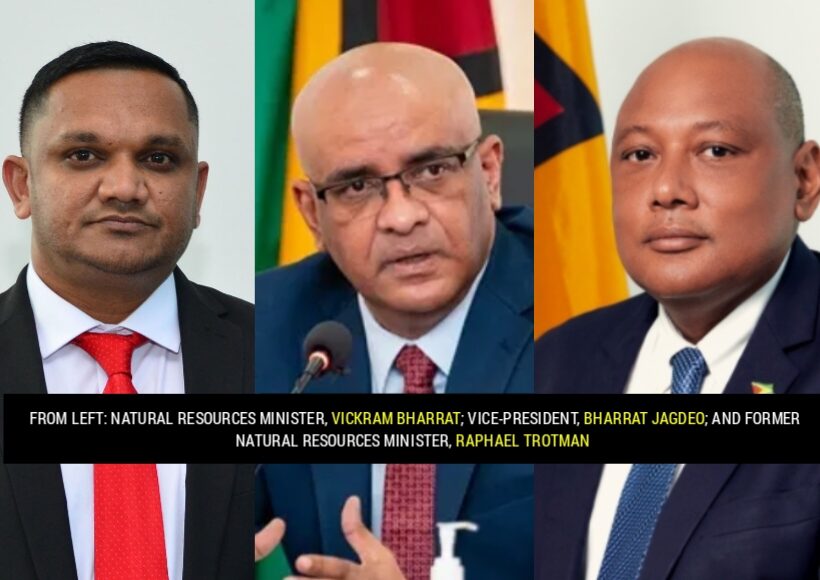In a scathing press statement on the former APNU+AFC administration’s handling of Guyana’s multi-billion-dollar petroleum sector, the Ministry of Natural Resources has defended its stellar track record in improving the management of the sector.
The statement published on Saturday, made reference to comments by the opposition in relation to the government’s oil sector management and laid out a litany of failures and missteps by the previous Coalition government.
“Before the APNU+AFC Opposition ventures to heap coals on the continuous improvements the government is making in the petroleum sector, it must first answer for its record. It is tone-deaf for the Opposition to say that the government is not administering the Stabroek Block contract as it should….,” the ministry said.
The ministry also pointed out that effective contract administration involves rigorous monitoring and oversight of offshore operations to ensure compliance with the agreement’s terms, and utilization of the terms to secure benefits for the people of Guyana.
“Fundamental regulatory and legislative tasks languished for years, leaving the country lagging in its preparedness to manage the sector. After correcting many of the grave missteps made by the APNU+AFC, that party now dares to stand on a clearly dizzying moral high ground, to lecture the government on what constitutes ‘effective contract management’,” the ministry said.
According to the statement, upon assuming office in 2020, the Irfaan Ali-led administration conducted a comprehensive audit of the petroleum sector, only to uncover a state of affairs characterized by neglect and mismanagement.
The ministry highlighted a pattern of neglect, secrecy, and incompetence by the APNU+AFC government in regards to the oil sector, and compared it with the changes and improvements the government has made since assuming office in August 2020.
Comparison
It was first highlighted that the previous administration signed and negotiated the 2016 Production Sharing Agreement (PSA) with ExxonMobil Guyana Limited (EMGL) for the lucrative Stabroek Block, which is armed with a stabilization clause that prevents Guyana from making any changes to the Guyanese people’s share.
That contract remained hidden, until it was finally released following public pressure. “…the document (the oil contract) remains the greatest giveaway of our history,” the ministry added.
The PPP/C administration is on record stating that the contract would not be renegotiated due to the sanctity of contract, and the devastating impacts such a course of action would have. Instead, the government has repeatedly stated that they will instead seek other ways to garner more benefits to the country without renegotiation.
Oil was discovered offshore Guyana in 2015 by the Exxon-led consortium in the Stabroek Block, and by December 2019 oil production commenced. The failure to enact a Local Content Act by the Coalition government resulted in substantial contracts being awarded to foreign entities, depriving local stakeholders of significant opportunities.
It was only in 2021, when a Local Content Act was passed by the government, heralding a new era of investment in Guyanese goods, services, and skills for the petroleum sector. In fact, since the enactment of the law, US$1 billion has been invested in the use and expansion of Guyanese and Guyanese businesses.
Long overdue reforms, including the overhaul of outdated legislation governing the petroleum industry, were highlighted as critical milestones achieved under the current administration. In August 2023, an updated Petroleum Activities Act was passed positioning Guyana on the path of responsible, transparent and modern petroleum management.
While the Coalition government faltered to make headway with the Gas-to-Energy project, the government has already awarded contracts for the transformative project which will slash energy cost by 50% while delivering clean and reliable energy by 2025.
The ministry also highlighted the delay in action by the Coalition regarding the Stabroek Block oil audits. Despite this, two audits spanning from 1999 to 2017 and 2018 to 2020 have been completed. Notably, in line with the government’s commitment to enhancing the capacity of Guyanese in the petroleum industry, a local firm was engaged for the 2018-2020 audit. Moreover, the procurement process for an audit of more costs has started and the award of a contract is imminent.
“Unjustly instituted a Natural Resource Fund (NRF) that would have produced a power-drunk minister, and which had such a complex withdrawal rule that it was criticized by the Inter-American Development Bank (IDB) for conspiring against transparency and public understanding,” it was stated.
To ensure maximization of value, the government proposed strengthening the legislative and regulatory framework for the sector, which it continues to do. It has also embarked on prudent contract administration to ensure the most efficient development and beneficial use of the resources while also securing benefits for locals beyond direct revenues. A strengthened NRF Act was passed in 2021, with robust provisions to improve transparency and accountability such as forming a Board of Directors, a nine-member committee for effective oversight, and mandatory publication of petroleum revenue reports in the Official Gazette, with 10 years’ imprisonment for non-compliance.
Remarkably, the ministry reminded that the Coalition government neglected to disclose a US$18 million signing bonus paid by ExxonMobil. When it was revealed that the signing bonus existed, the APNU+AFC government claimed that it was a gift.
It should be noted that the Petroleum Activities Act clearly stipulates the instances where signature bonuses may be applied and the process for doing so. This was enforced for the 2022 Licensing Round where the minimum signing bonuses of US$10 million for shallow water blocks and US$20 million for deepwater blocks were defined in the requisite Gazette Notice and the published Terms of Reference.
The ministry underscored that these actions further demonstrate the government’s unwavering commitment to transparency and accountability.
It is instructive that the APNU+AFC government issued Exxon’s Liza Phase One Environmental Permit on the very day they received the extensive 1500-page Environmental Impact Assessment (EIA) for the project. “Not only does this prove they performed no review, but the permit also violated the law, as it was given a 20-year term despite the law allowing a maximum five-year term,” the ministry added.
However, the government has taken decisive steps to rectify this situation by ensuring that all permits undergo a meticulous review process to align with legal requirements.
Additional Achievements
The government has revamped environmental permits, introducing provisions such as a US$50 flaring fee, adherence to international standards for treating produced water, and comprehensive waste management protocols. These changes aim to ensure responsible resource extraction and environmental stewardship.
Under the PPP’s leadership, Guyana executed its inaugural licensing round, with awards expected later this year. Moreover, the government introduced updated model Production Sharing Agreements (PSAs), featuring improved fiscal terms, including the lowering of the cost recovery ceiling to 65%, a new royalty rate of 10% and a 10% tax on petroleum profits, fostering a more equitable distribution of earnings. This is a significant improvement to the PSA that was signed with Exxon gives the Stabroek Block partners a tax-free ride. Also, the 2016 PSA stipulates that Exxon recovers cost oil which is earmarked as 75% of the earnings off the top before the remaining 25% is then shared with Guyana as profit, meaning the country receives 12.5% along with a 2% royalty.
The government has bolstered regulatory frameworks governing field development plans (FDPs), instituting a more rigorous review process aligned with international standards. Also, a Gas Monetization Strategy that is currently at the stage of finalization and a landmark oil spill legislation is now in the pipeline.
Government secured a US$2 billion parent company guarantee for oil spills, US$600 million per occurrence insurance package. Added to this, there is strengthened oil spill response and inspection capabilities, including requiring that well control technology be kept in-country which includes a first response toolkit, heavy debris removal tools and a capping stack.
Efforts were made to enhance institutional capacity within key agencies, such as the Guyana Revenue Authority (GRA), Environmental Protection Agency (EPA), Guyana National Bureau of Standards (GNBS), Guyana Geology and Mines Commission (GGMC), the Local Content Secretariat and the Ministry of Natural Resources.
Moreover, the government has prioritized workforce development initiatives, investing in training programs to equip Guyanese with the skills needed for employment in the oil and gas industry. The establishment of the Guyana Technical Training College further underscores the government’s dedication to grooming a skilled workforce capable of contributing to sectoral growth.
Through Memoranda of Understanding (MoUs) with oil-producing nations, the government has sought to strengthen economic diplomacy and cooperation in the oil sector, fostering mutually beneficial partnerships and opportunities for knowledge exchange.













